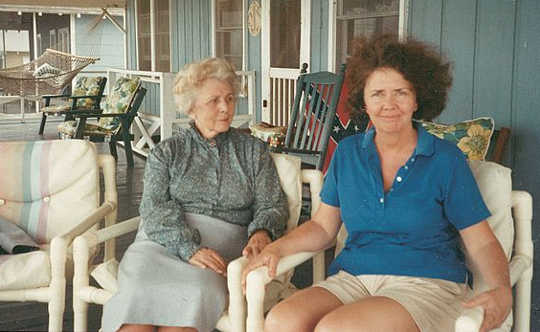
American author Gail Godwin with her mother in 1985 at Pawley's Island. Photo by Robert Starer - Provided by Gail Godwin, CC BY-SA 3.0
Acceptance is a major theme of world religions. In modern life, however, acceptance is tension-filled and problematic. The urge to fix, change, and improve pops up at every turn. Reinhold Neibuhr summed up this tension in his Serenity Prayer, written in 1934:
"God, grant me the serenity to accept the things I cannot change,
the courage to change the things I can,
and wisdom to know the difference."
Not surprisingly, this elegant prayer has become the mantra of Alcoholics Anonymous, spoken collectively at the start of AA meetings. It could just as well be a prayer spoken at a marriage ceremony, at the birth of a child, or by a head-of-state during an inaugural address.
In exploring acceptance, the following Neibuhr-inspired questions come to mind. They are not questions with easy answers but rather thinking points that may stay with you for years, churning, provoking, and waiting for the right moment to find resolution:
* What personal qualities are you unable to change, and, therefore are forced to accept?
* What personal qualities are you unwilling to give up? What are the consequences of this?
* What traits or behaviors in your adult children are you unable to change? -- unwilling to try to change?
* What is your moral position regarding the attempt to change another person, even (or especially) your own child?
* What is the relationship between self-acceptance and acceptance of your adult child?
Pondering Acceptance
Pondering acceptance can lead us into some rich, many-veined mines. Extracting the ore, however, is often difficult. We are obliged to accept the fact of our aging and the inevitability of our death -- easy to say, hard to do. A major function of religion is to help us to explain, rehearse, and prepare for death. We are the only species that knows that death is inevitable; it comes with the package. It colors our lives in big and little ways. A healthy acceptance of aging and death allows us to cherish our time on earth and to work to improve and fine-tune those things that can be improved. Our relationship with our adult children may be one of those things.
We are also obliged to accept the facts of our individual histories. We cannot change, much as we might want to, our birthplace in a small town in the Ozarks or a railroad flat in New York City. We can change our attitudes to our past but not the facts of our past. If our parents were seriously overweight, never learned to read, or were wheelchair bound, if our younger brother was killed in action, if our sister got pregnant at 15 and had a baby -- these chunks of our history have made their mark in our historical panorama, and these people have taken their place in our life's cast of characters.
In addition to the unchangeable facts of our histories are the often implacable "givens" of our bodies. For all practical purposes, we are unable to change genetically-based traits -- our musical ear (or lack of it), for example. Coming to terms with physical infirmity, self-defined imperfection and what we might define as "stigma" can involve a lifetime of hard work.
A 6'2" woman or a 5'2" man in Anglo-American culture may stand out in a crowd as too tall or disappear in a crowd as too short. Neither one can significantly change his or her height. They were dealt a certain hand by their DNA, or, if you like, by God. Accepting that hand is a formidable goal towards which to work. Self-acceptance allows our lifework to be useful, integrated and fulfilling. It allows our unique beauty -- yours and mine -- to unfold freely.
Accepting with Awe and Wonder
There are many parts of ourselves that we may be able to look at not just with acceptance but with awe and wonder. Look at your hands, for example. These two exquisitely deft instruments of manipulation are whole and able. There are hundreds of things you do with them every day. Your opposable thumbs represent millions of years of mammalian/simian/human evolution. With them you can wrap a birthday present, give a friend a shoulder rub, write a shopping list, practice the violin, hold a baseball bat, button your jacket, knot your tie, sand the turned legs of a country table, weave a rug or hammer a nail.
Your life is immensely improved because you have opposable thumbs. Pay homage to them every once in a while; look at them in wonder. Then consider your feet.
After you have done this for your magnificently nuanced physical apparatus -- even if parts of it are too small or too large or not working up to code -- then consider your heart. Not the muscular machine that beats within your chest but the part of you that feels, empathizes, and loves. We call this "organ" the heart because it is quintessentially vital for spiritual life, just as the blood-pumping heart stands at the forefront of physical life and death. Consider the heart as it relates to acceptance -- of ourselves and our loved ones and especially of our adult children.
By means of this heart we are able to stretch ourselves beyond basic animal satisfaction of immediate needs. We can see and hear and feel the needs of others with very different histories from our own. We have suffered in various ways, so we conclude that others -- perhaps all others -- have suffered as well. Author and critic G.K. Chesterton put it this way: "We are all in the same boat in a stormy sea, and we owe each other a terrible loyalty."'
Can we feel compassion for our adult children's suffering instead of denying it or fighting it? Can we accept our adult children's suffering even when we, their parents, are partly responsible for it?
This last is a tall order. It suggests that we open a wound -- or, perhaps, create a new wound -- a wound that may throb and bleed. But the more profoundly you understand your children's suffering, the more you can accept them and love them.
The following three "if-then" hypotheses are another expression of this connection:
* If you can accept yourself as you are, then you will be able to accept your adult child the way she is.
* If you are able to accept your adult child the way he is, then you will be able to be a friend to him.
* If you are a friend to your adult child, then you will love her freely, openly, and without impediments and she, in turn, can love you much the same way.
Reprinted with permission of the publisher,
New Society Publishers. ©2001.
http://www.newsociety.com
Article Source
All Grown Up: Living Happily Ever After with Your Adult Children
by Roberta Maisel.
 Many parents in their 50s and 60s don't know how to parent their adult children. Yet increases in health and longevity mean that parents and their children may share 40 or more years together as adults. All Grown Up describes how mid-life parents and their grown children can celebrate this new lease on life together by developing loving and egalitarian friendships that are positive and guilt-free. Using conflict resolution strategies borrowed from the field of mediation, a healthy respect for generation-gap issues engendered by the social revolutions of the 1960s and '70s, and a broad spiritual perspective, the author provides both practical solutions to on-going problems, as well as thought-provoking discussions of how these problems came to be.
Many parents in their 50s and 60s don't know how to parent their adult children. Yet increases in health and longevity mean that parents and their children may share 40 or more years together as adults. All Grown Up describes how mid-life parents and their grown children can celebrate this new lease on life together by developing loving and egalitarian friendships that are positive and guilt-free. Using conflict resolution strategies borrowed from the field of mediation, a healthy respect for generation-gap issues engendered by the social revolutions of the 1960s and '70s, and a broad spiritual perspective, the author provides both practical solutions to on-going problems, as well as thought-provoking discussions of how these problems came to be.
Info/Order this paperback book.
About the Author
 ROBERTA MAISEL is a volunteer mediator with Berkeley Dispute Resolution Service in Berkeley, California. She is an enthusiastic parent of three grown children and, at various times in her life, has been a school and college teacher, antique shop owner, piano accompanist, and political activist working with and for Central American refugees, homeless people and Middle East peace. More recently she has given talks and workshops on aging, living with loss, and getting along with adult children.
ROBERTA MAISEL is a volunteer mediator with Berkeley Dispute Resolution Service in Berkeley, California. She is an enthusiastic parent of three grown children and, at various times in her life, has been a school and college teacher, antique shop owner, piano accompanist, and political activist working with and for Central American refugees, homeless people and Middle East peace. More recently she has given talks and workshops on aging, living with loss, and getting along with adult children.
Related Books
at InnerSelf Market and Amazon




























